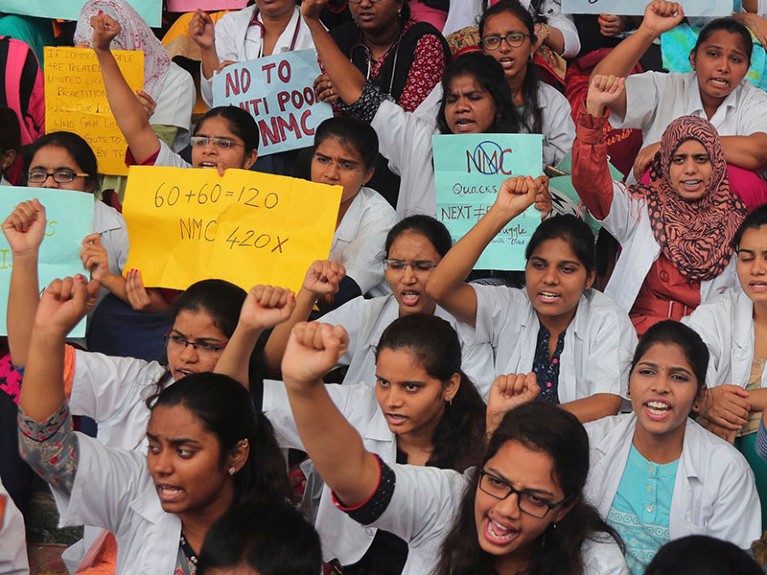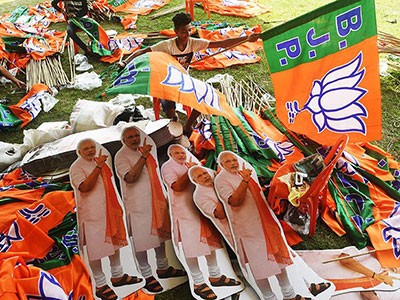
India’s doctors are protesting about government plans to shake up the regulation of medical education and research.Credit: Mahesh Kumar/AP/Shutterstock
India’s government, still fresh from re-election in May, is a government in a hurry. In the 37 days for which parliament sat in its most recent session, 38 bills were introduced, and 28 were passed.
One bill to pass is the National Medical Commission Bill, and doctors’ representatives are among those concerned. At the end of July, many abandoned their hospital wards and surgeries, and took to the streets in a nationwide strike — and more could be coming. The government, on the other hand, is determined to press ahead with what it regards as long-overdue reforms to a failing system.
The bill abolishes the 85-year-old Medical Council of India. This is the doctors’ accreditation body, and it also sets standards for undergraduate and postgraduate medical training. It is to be replaced with a new National Medical Commission with expanded powers, including a mandate to regulate medical research.
An update of standards in medical education and research is certainly overdue. When the medical council was founded, India had many fewer institutions offering the coveted MBBS degree; today the council must regulate 479 medical colleges that oversee the training of more than 60,000 graduates each year.
Three years ago, a parliamentary health committee called for a common national standard to be set for medical training. Slightly more than half of all medical colleges in India are now privately owned, and the MPs on the committee found that the interests of private colleges were over-represented in the council’s governing body, giving rise to concerns that conflicts of interest need to be better managed.
The MPs recommended establishing a new regulator, whose members would be selected through an independent process. The government accepted this and other recommendations, but in doing so it has ignited a war with doctors’ representative bodies, for whom the changes amount to government interference and a loss of autonomy — especially as commission members will no longer be elected by the doctors themselves, but will be appointed by the government.
But the government has good reason to want to act. Although the rates of communicable and non-communicable diseases remain unacceptably high, India has only one doctor for every 1,456 people, compared with the World Health Organization’s recommended ratio of 1 to 1,000.
Science and the rise of nationalism in India
The government is proposing to help plug this gap by granting licences to 150,000 community health workers over the next 5 years. Such personnel are common in many countries. They provide basic as well as emergency medical care — often in rural areas where the shortage of doctors is more acute. But India’s bill does not specify minimum entry requirements for community health workers, nor does it say how they will be trained or how long training will last.
The Ministry of Health and Family Welfare says that licensed community health workers will enable rural populations to access better quality health care — nearly 60% of those who claim to practise medicine in India do not have a medical qualification. But according to the Indian Medical Association’s secretary, R. V. Asokan, it would be much better to find more roles for graduates from medical schools — half of whom are unable to secure jobs every year.
The bill also neglects to provide details of how the new medical commission will regulate researchers. The bill’s text “encourages medical professionals to adopt latest medical research in their work and to contribute to research”, but there are, as yet, no mechanisms by which this might be achieved. The need is there. Existing funding for student research projects is meagre, and research outputs from India’s medical training institutions are comparatively few — but this is unlikely to change under the new system. The government also has an opportunity to work with universities to ensure that undergraduates experience better training in the basics of research protocols, data and statistics, ethics and public health.
India’s doctors and its government need to move quickly to settle their differences. Urban and rural populations need more research-based quality health care; and they need to be confident that the soon-to-be-appointed community health professionals have appropriate knowledge and experience.
What they don’t need is an ongoing war of words between their government and the medical establishment.

 India’s clinical-trial rules to speed up drug approvals
India’s clinical-trial rules to speed up drug approvals
 Science and the rise of nationalism in India
Science and the rise of nationalism in India
 India debates a nationwide tenure system
India debates a nationwide tenure system




